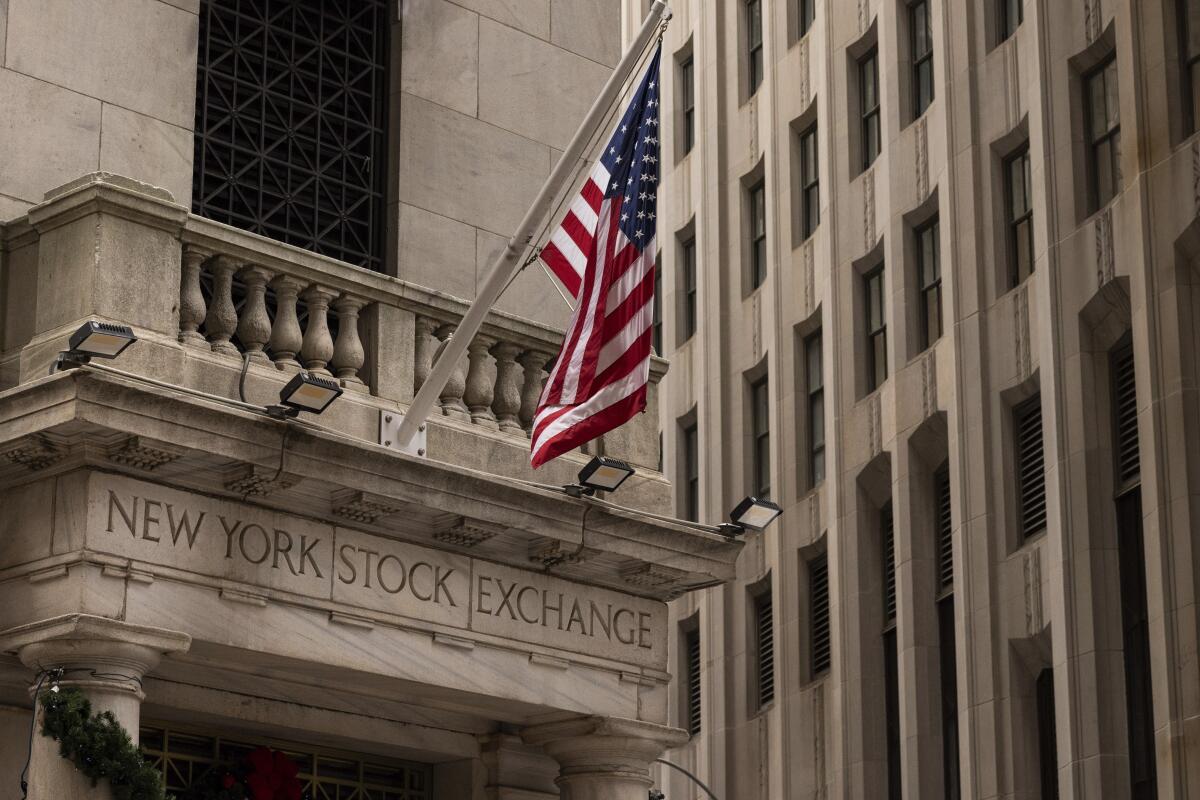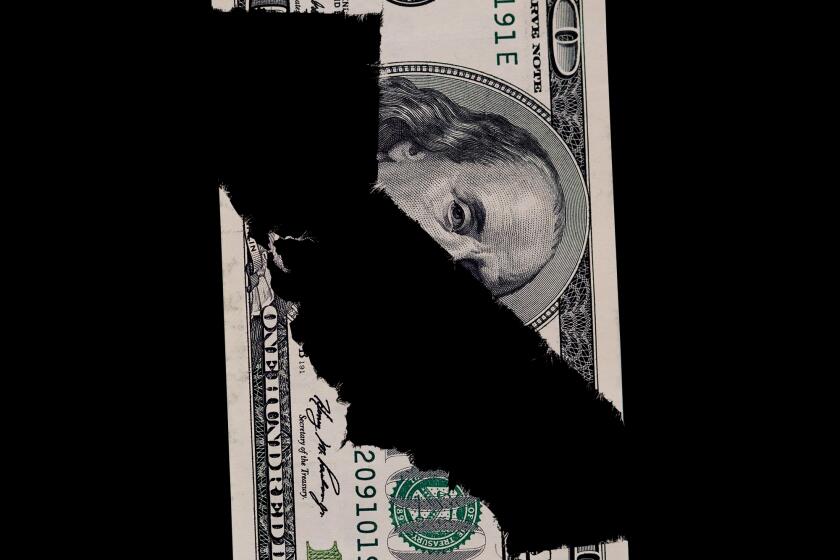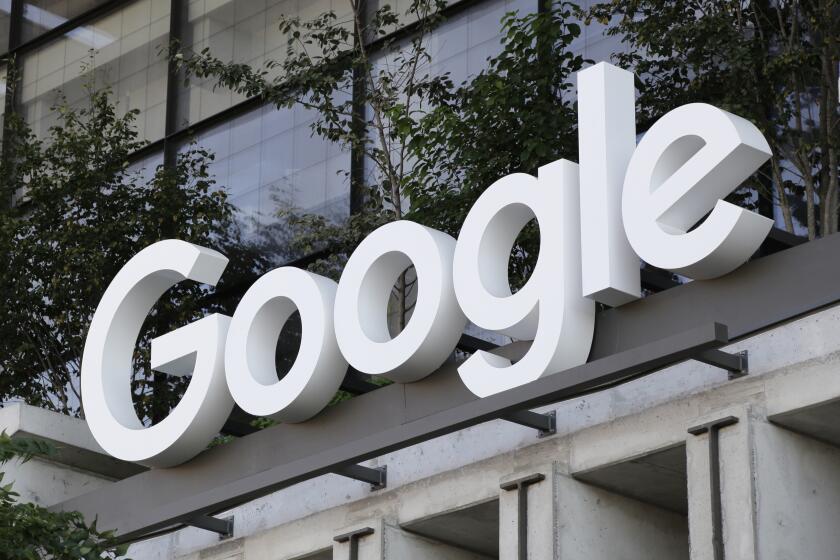Wall Street ticks up, and S&P 500 pulls closer to a record on rate-cut hopes

- Share via
Wall Street ticked higher Tuesday and pulled closer to its record amid hopes that moves by Japan to keep interest rates easy for investors could be a preview for the rest of the world.
The Standard & Poor’s 500 index rose 0.6% and is just 0.6% shy of its record set nearly two years ago. The Dow Jones industrial average gained 0.7% and set its own record for a fifth straight day, while the Nasdaq composite climbed 0.7%.
Enphase Energy jumped 9.1% for the biggest gain in the S&P 500 after the maker of microinverters for the solar energy industry told employees it will cut 10% of its global workforce and make other streamlining changes. Stocks of oil-and-gas companies also pushed the market higher after crude prices recovered some of their sharp drops from recent months.
Around the world, stock markets abroad were mixed in mostly quiet trading. Japan was an exception, and the Nikkei 225 jumped 1.4% after the country’s central bank decided to keep its benchmark interest rate below zero in hopes of encouraging more borrowing and spending.
The S&P 500 has rallied more than 15% since late October on hopes that a similar, easier approach to interest rates may be coming to Wall Street.
With inflation down from its peak two summers ago and the economy still growing, the rising expectation is for the Federal Reserve in 2024 to pivot away from its campaign to hike interest rates dramatically.
In a reversal from past decades, more college graduates and professionals are moving out of California than coming into it to escape the higher taxes and cost of living.
Fed Chair Jerome H. Powell seemed to give a nod toward such hopes last week when he did not push forcefully against traders’ expectations for several cuts to rates next year. Wall Street loves lower rates because they give investment prices a boost and relax the pressure on the economy and the financial system.
The hope is that the Fed can pull off what was earlier seen as the trickiest tightrope walk, by first getting inflation under control through high interest rates and then cutting rates lower before they can push the economy into a recession.
A report Tuesday morning showed the housing industry appears to be in stronger shape than expected. Home builders broke ground on many more new homes in November than expected, 200,000 more at a seasonally adjusted annualized rate.
Of course, Wall Street’s big recent moves also have critics saying the market’s rally looks overdone and that stocks now look too expensive relative to how much profit companies are making. More cautious investors also say the number of rate cuts that traders are penciling in for 2024 look unlikely unless the U.S. economy falls into a recession.
Some Fed officials have also been sounding more cautious about the prospect for rate cuts since Powell’s comments last week. On Friday, for example, the president of the Federal Reserve Bank of New York said it was “premature to be even thinking” about whether to cut rates in March.
Measles cases are surging in Europe and Central Asia, according to the World Health Organization. Who’s responsible? The anti-vaccination movement and its leaders, such as Robert F. Kennedy Jr.
Markets have nevertheless been ebullient, with the S&P 500 coming off its seventh straight winning week for its longest such streak in six years.
Showing how ravenous buyers have become, clients at Bank of America poured $6.4 billion more into U.S. stocks last week than they withdrew. It’s the fourth-largest weekly inflow since it began tracking the data in 2008, strategist Jill Carey Hall said in a BofA Global Research report.
To Lori Calvasina, head of U.S. equity strategy at RBC Capital Markets, the S&P 500 still looks reasonably valued given moderating inflation. But she also says the risk of a “short-term pause” for the market is rising given how much fervor has built up, with one survey of investor optimism well above its long-term-average, among other potential signals of caution.
In the bond market, the yield on the 10-year Treasury slipped to 3.92% from 3.94% late Monday. It was above 5% in October, at its highest level since 2007 and putting tremendous downward pressure on the stock market.
Elsewhere on Wall Street, shares of Tylenol maker Kenvue rose 2.2% after a favorable ruling in federal court. The company sought to exclude the opinions of experts in a multijurisdictional case against it on whether in-utero exposure to acetaminophen, the pain reliever used in Tylenol and other generic drugs, could lead to autism or attention deficit disorder.
Judge Denise Cote of the U.S. District Court for the Southern District of New York agreed with Kenvue, ruling Monday that the testimony was inadmissible.
Google has agreed to pay $700 million to settle allegations that it had been stifling competition at its Android app store.
All told, the S&P 500 rose 27.81 points to 4,768.37. The Dow gained 251.90 points to 37,557.92, and the Nasdaq climbed 98.03 points to 15,003.22.
AP writers Matt Ott and Elaine Kurtenbach contributed to this report.
More to Read
Inside the business of entertainment
The Wide Shot brings you news, analysis and insights on everything from streaming wars to production — and what it all means for the future.
You may occasionally receive promotional content from the Los Angeles Times.













